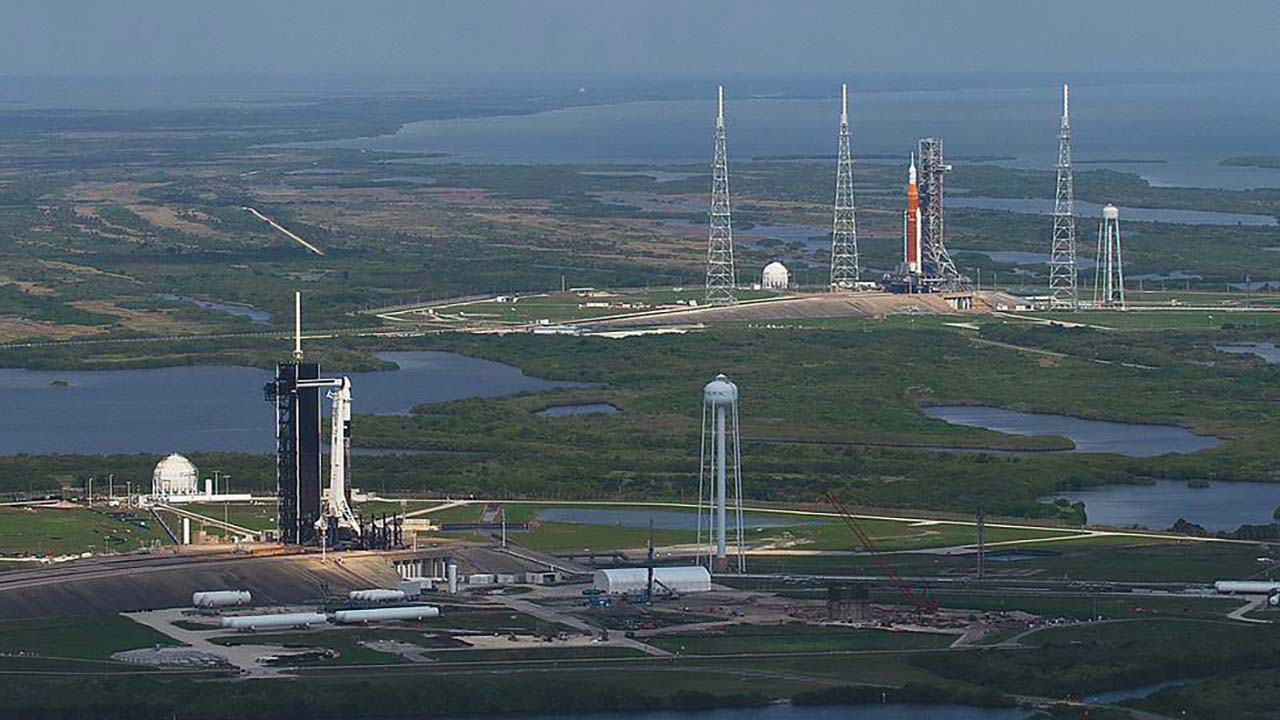The James A. Abrahamson Space Leader Fellowship is a 12-month advanced learning experience sponsored by the International Space Station (ISS) National Laboratory through the Center for the Advancement of Science in Space, Inc. (CASIS). The fellowship is designed to promote workforce development for exceptional undergraduate and early-stage graduate students from underrepresented groups by introducing them to the diversity of research and technology development enabled by space. Fellows will work closely with the CASIS team and its network of partners to advance the ISS National Lab mission and our nation’s goal to commercialize low Earth orbit (LEO).

Lieutenant General James A. Abrahamson (USAF Retired)
Media Credit: Image courtesy of NASA
The fellowship is named after Lt. Gen. James A. Abrahamson (USAF Ret.), who is widely regarded as one of the more distinguished and decorated military program leaders of the 20th century. Lt. Gen. Abrahamson began his military career as a fighter pilot in Vietnam and was ultimately selected for the Air Force Manned Orbiting Laboratory program (later canceled). After his time as a pilot and astronaut candidate, Lt. Gen. Abrahamson ascended to multiple essential Air Force and NASA staff positions, including his assignment as NASA’s Associate Administrator for Space Flight. Additionally, in 1984, upon President Reagan’s request, Lt. Gen. Abrahamson served as the first director for the Strategic Defense Initiative (the “Star Wars Program”) until he retired from service in 1989. Since his retirement, Lt. Gen. Abrahamson has kept active, maintaining leadership positions within various aviation industry companies and serving on the board of directors for GeoEye Corporation and Global Relief Technologies. Lt. Gen. Abrahamson is a graduate of the Massachusetts Institute of Technology with a B.S. in aeronautical engineering and received his M.S. in aeronautical engineering from the University of Oklahoma.
NASA awarded Lt. Gen. Abrahamson an Exceptional Public Achievement Medal for his contributions to NASA’s goal of LEO commercialization during his time as the chair of the board of directors and interim executive director of the Center for the Advancement of Science in Space.
Applications for 2024 are now closed.
Program
The Abrahamson Space Leader Fellowship is anticipated to last 12 months. Fellows will work with a CASIS mentor and a subject matter expert in a field relevant to the student’s major area of study and aerospace career interest. With the guidance of the CASIS mentor and opportunities to network with ISS National Lab stakeholders, the fellow will develop and execute a concept proposal to advance the ISS National Lab’s mission.
All concept proposals will be reviewed and approved by a CASIS subject matter expert. Proposals will focus on key areas of interest to the fellows and their career aspirations. They will be designed to allow for maximum exposure to the ISS National Lab mission and the greater LEO commercialization effort. Fellows will also have an opportunity to submit their concept proposal for review to present at the annual ISS Research and Development Conference (ISSRDC), typically held in July or August each year. Each fellow’s experience will be unique, but all will exit with knowledge of new space commercialization endeavors, a comprehensive understanding of research and development efforts on the ISS National Lab, and introductions to aerospace leaders and stakeholders in the ISS National Lab mission.
Fellows are expected to attend regular meetings with their mentor and contribute at least eight hours per week to the program, with flexibility for other educational commitments. Fellows can participate remotely and will not need to relocate to Florida or Texas, where CASIS maintains its primary offices. However, there may be opportunities to travel to the CASIS offices as part of the program.
Fellows will be expected to work independently and develop aspects of their concept proposal to make it their own. Areas of specific interest to the fellow can be built into the program at the CASIS mentor’s discretion. CASIS mentors will receive inclusive mentor training resources that address diversity through the CASIS Learning Management System.
Outcome
Participation in the Abrahamson Space Leader Fellowship will enable students from underrepresented groups in aerospace to pursue their career interests through lasting networking opportunities with government, academic, and commercial partners and will prepare them to:
- Communicate the value of scientific discovery and technological innovation in space
- Understand the importance of U.S. leadership in commercial space
- Gain techniques and insight to inspire the next generation through science, technology, engineering, and mathematics (STEM)
The fellowship will be designed to help each participant grow in these specialty areas, assisting promising students in developing into professionally thriving leaders.
Eligibility
- Applications will be accepted from students who are part of underrepresented groups in aerospace, education, or related STEM fields in their junior or senior years. Students must be pursuing a bachelor’s degree or graduate students in their first or second year pursuing a master’s degree or doctorate at any U.S. accredited academic institution. This includes non-STEM majors who intend to enter the workforce in a way that is related to the growing economy in low Earth orbit.
- Applicants should intend to pursue a career in aerospace or a related STEM field.
- Applicants must be a U.S. citizen or permanent resident (U.S. person defined under 22 U.S. Code §6010).
- Applicants may have diverse experience and academic interests that include science, engineering, business, communications, education, management, or other fields related to aerospace.
Fellowship
Each fellow will receive a one-time fellowship of $5,000 plus reimbursement for authorized sponsored travel expenses.
Application and Selection Process
Application Components
- Resume or CV
- Academic Transcript
- Please note that CASIS is sensitive in our approach to reviewing applicants’ academic work, test scores, and GPAs. We are aware that many college and graduate school students are dealing with disruptions in their personal and educational lives. Grades can be overshadowed by extraordinary achievements represented in other parts of the overall application. Activities such as athletics and work experience can serve as evidence of character and commitment.
- Two Letters of Recommendation
- Abstract (500 words or less) of possible concept proposal to be completed within the program (non-binding; alternate concepts can be selected once within the program)
- Personal Statement (1000 words or less), addressing the following questions:
- What makes you a good candidate for the Abrahamson Fellowship?
- What makes you a leader in your peer group or community?
- How will you use the fellowship to make you a stronger candidate for a leadership role in the aerospace community?
- What does diversity mean to you?
Selection Committee and Criteria
All application materials will be reviewed by a CASIS committee comprised of the Education Program Director, STEM team, and a subject matter expert from the Business Development, Communications, and Science and Technology departments.
Criteria for selection are detailed below, with scores totaling a possible 100 points.
Background & Professional Accomplishment (~40 points)
- Solid education and experience in the area of expertise, appropriate to career stage and field.
- Employment in relevant academic, technical, research, administration, outreach, or policy positions appropriate to career stage and field.
- Portfolio or record of publications and accomplishments appropriate to career stage, field, and institutional setting.
- Record of grants or participation in projects or other initiatives appropriate to career stage, field, and institutional setting.
- Likely impact of the fellowship experience on the applicant’s career.
- Identification with an underrepresented group, including but not limited to ethnic and racial minority groups, women, people with disabilities, and veterans, candidates currently living in underserved and underrepresented communities, and those who represent a diversity of gender, sector, region, experience, expertise, or other factors.
Commitment to Fellowship Mission & Opportunities (~25 points)
- Excellent communication skills: articulate, cohesive, concise, logical flow of information, and clear in both context and detail.
- Strong interest in applying knowledge toward the solution of problems in areas in which the fellowship would be served.
- Clarity of objectives for applying to the fellowship, and how the fellowship experience will be used in the future.
- Willingness and flexibility to tackle issues beyond the area of expertise.
- Realistic expectations, open-minded, and adaptable to fellowship opportunities and challenges.
- Demonstrated or communicated a commitment to public service or science research.
- Well-conceived and thoughtful presentation of ideas in the submitted abstract.
- Demonstrated understanding of the field and areas of contemporary discussion.
- Forward-thinking connection to possible future use/application.
Leadership & Potential (~20 points)
- Prior leadership roles relevant to career stage (e.g., graduate student governance committees; advisory or editorial committees; active in professional societies, nonprofit, or community initiatives).
- Skill/potential to organize, build consensus, lead projects and people toward positive outcomes.
- Confidence, maturity, and self-direction with the capacity, initiative, and flexibility to work well independently and in groups.
- Ability to identify personal strengths and areas for growth and development.
- The candidate has demonstrated creativity, originality, and initiative in one or more aspects of her/his life.
- The candidate has demonstrated a commitment to and capacity for accomplishment that has required drive and sustained effort.
- Potential to take the initiative to make the fellowship a rich and positive experience, disseminate the skills learned through the fellowship, and take advantage of networks developed.
Analytical & Problem-Solving Abilities (~15 points)
- Evidence of creative thinking and analytical skill.
- Ability to translate and apply theoretical concepts into practice to solve problems.
- Capacity to make connections between their field and broader economic, social and political issues.
Please contact us at [email protected] with questions regarding the fellowship.




